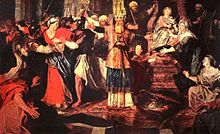Athalia (Handel)


Athalia ( HWV 52) is an oratorio in three acts by Georg Friedrich Handel .
Emergence
Unlike Handel's other oratorios, Athalia was written for a performance in Oxford at a time when Handel was still mainly composing operas . According to a newspaper article, an honorary doctorate should be awarded at the anniversary celebrations for the founding of the university. For unknown reasons he did not accept the award, but in addition to the Athalia, his earlier oratorios Esther , Deborah and the Masque Acis and Galatea were also presented in Oxford .
It is not known exactly when Handel began composing. According to his usual working style, it is assumed that this could not have been before the end of the 1733 season, i.e. in April. The completion of the work is indicated in the score as June 7, 1733.
The first performance took place on July 10, 1733 at the Sheldonian Theater in Oxford, the next day the oratorio was repeated.
In the following year 1734, on the occasion of the wedding of Princess Anne to Prince William of Orange , Handel used large parts of the composition for his Serenata Il Parnasso in Festa .
libretto
The libretto was written by Samuel Humphreys . It is inspired by the tragedy Athalie , which Jean Racine wrote in 1691. This in turn is based on a story described in the books of kings ( 2 Kings 11 ) and the chronicle ( 2 Chr 22 ).
people
The line-up for the premiere consisted of the following singers:
- Athalia , Queen of Judah, Baalist - Mrs. Wright (soprano)
- Joad, a high priest - Walter Powell (countertenor)
- Josabeth, wife of Joad - Anna Maria Strada (soprano)
- Joas - a boy
- Mathan, a Baal priest - Philip (Gaetano Philippo) Rochetti (tenor)
- Abner, Army Leader - Gustavus Waltz (Bass)
action
first act
The Jews prepare their harvest festival. The high priest Joad complains about how Queen Athalia rules the land tyrannically and worships the idol Baal.
Athalia wakes up and tells Mathan about her dreams. Her mother's ghost floated towards her and warned her about Judas God. When she tried to hug her mother, she withdrew and was torn to pieces by wild animals. Then she saw a boy in a priestly robe, who smiled gently at her, but then stuck a dagger in her chest. Mathan tries to cheer her up, it was just a dream. But since Athalia is still depressed, Mathan wants to find out the identity of the boy from the temple priests and kill him.
Joad and his wife Josabeth raised the king's son Joas , but he knows nothing of his true descent. Abner warns her of the Queen's intent. Josabeth is concerned, but the high priest trusts God will protect the boy.
Second act
The Jews celebrate the harvest festival. Abner wants the country to be freed from oppression. Joad reveals to him that there is a legitimate heir to the throne - namely the boy he raised. Abner then declares that he will protect him with the sword.
Athalia appears and asks if the boy is Josabeth's child. Josabeth says no, and Joas pretends to be the orphan Eliakim. Athalia wants to bring him to her palace, but he refuses because he does not want to perform idolatry. Athalia falls into thoughts of revenge. Josabeth is desperate again and is encouraged by Joas.
Joad and Josabeth express their trust in a good outcome.
Third act
In a divine enlightenment, Joad prophesies that the wicked rule will come to an end and Athalia will die. He asks Joas whose rule he would use as an example if he had a choice. Joash replies, " David, " whereupon the high priest and his wife announce that Joash is a king's son and the new ruler.
Mathan approaches Josabeth, but is rejected as a hypocrite. Athalia appears and demands the child's extradition, but Joad introduces him to her as the new king. Abner refuses to obey her, and Mathan realizes that Judas God has triumphed. Athalia swears vengeance.
Finally, the Jews praise and thank God for his kindness.
Web links
- Score by Athalia (Handel work edition, edited by Friedrich Chrysander , Leipzig 1859)
literature
- Winton Dean : Handel's Dramatic Oratorios and Masques . Clarendon, Oxford 1989, ISBN 0-19-816184-0 , (Original edition: Oxford University Press, Oxford 1959), (English).
- Hans Joachim Marx : Handel's oratorios, odes and serenatas. A compendium. Vandenhoeck & Ruprecht, Göttingen 1998, ISBN 3-525-27815-2 .
- Albert Scheibler, Julia Evdokimova: Georg Friedrich Händel. Oratorios guides . Edition Cologne, Lohmar 1993, ISBN 3-928010-04-2 .

